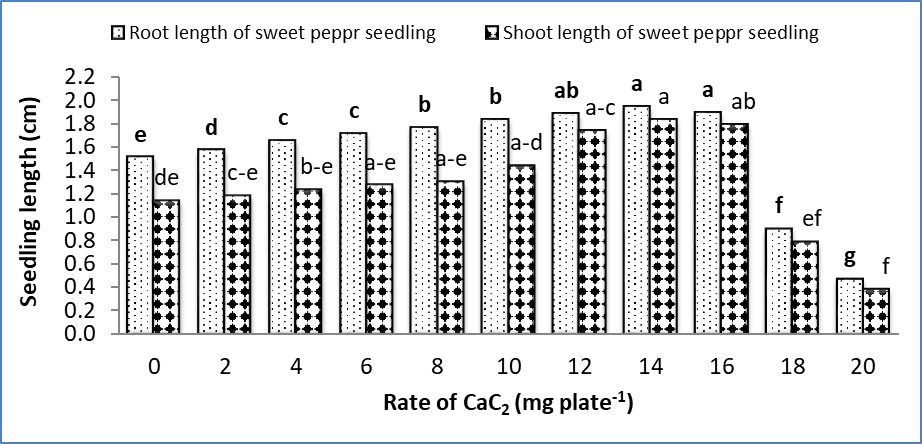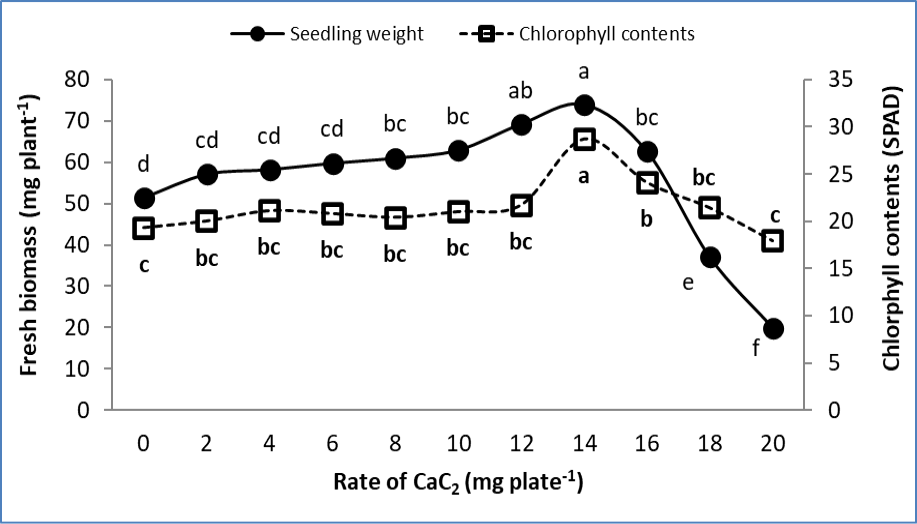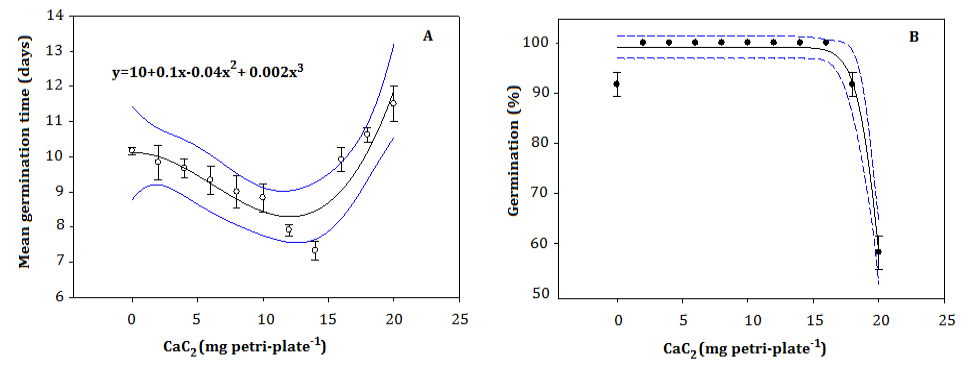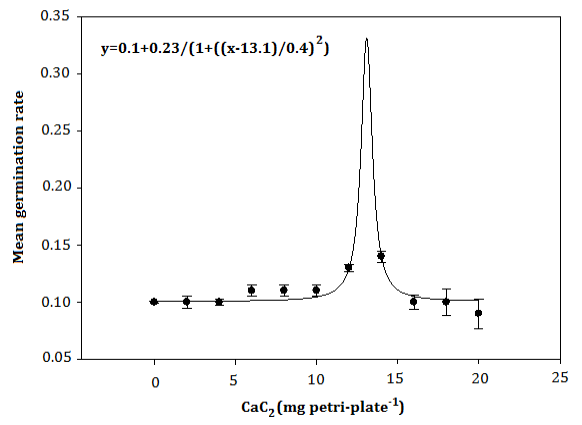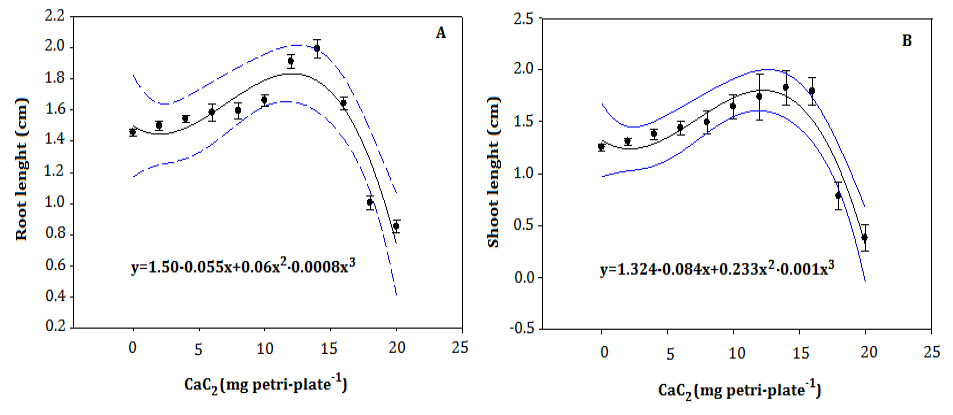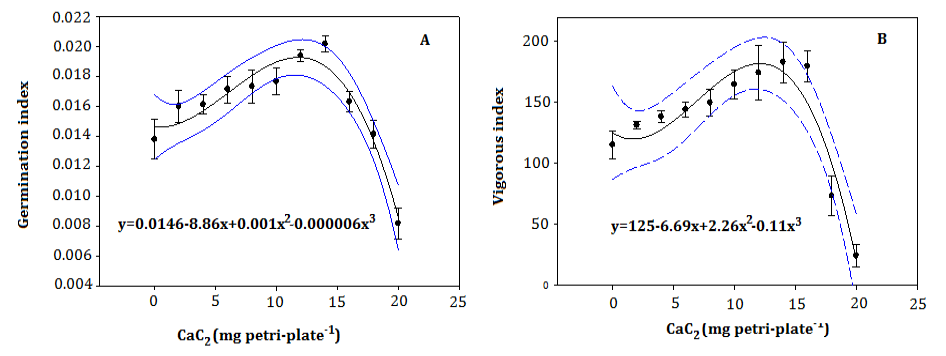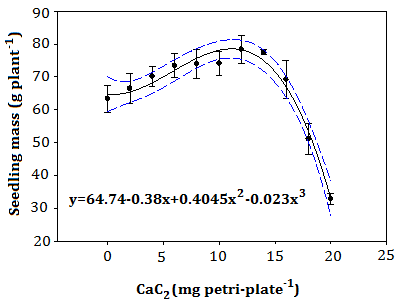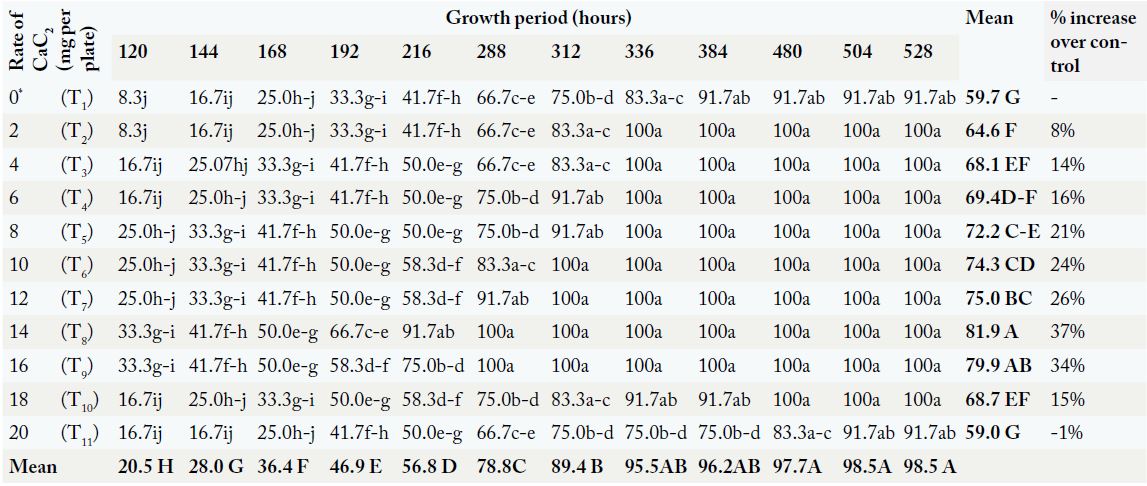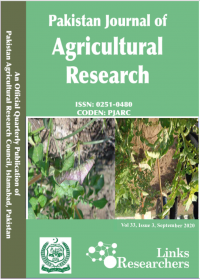Calcium Carbide Induced Ethylene Regulates Seed Dormancy and Post-Germination Growth of Sweet Pepper
Wazir Ahmed1*, Muhammad Naeem Akhtar2, Muhammad Waseem Akhtar3, Muhammad Nauman Hanif1, Aiman Salah ud Din4 and Ahmad Mahmood1
1Department of Soil and Environmental Sciences, MNS University of Agriculture Multan, Pakistan; 2Pesticide Quality Control Lab, Multan, Pakistan; 3Department of Plant Breeding and Genetics, University of Agriculture, Faisalabad. Pakistan; 4State Key Laboratory of Marine Food Processing & Safety Control, College of Food Science and Engineering, Ocean University of China, No.1299, Sansha Road, Qingdao, Shandong Province, 266404, P.R. China.
*Correspondence | Wazir Ahmed, Department of Soil and Environmental Sciences, MNS University of Agriculture Multan, Pakistan; Email: muhammaduam01@gmail.com
Figure 1:
Effect of different rates of calcium carbide on root and shoot length under control conditions after 528 h of incubation at 15±2°C.
SL: RL ratio: 0.86 (0 mg CaC2), 0.88 (2 mg CaC2), 0.90 (4 mg CaC2), 0.91(6 mg CaC2), 0.94 (8 mg CaC2), 0.99 (10 mg CaC2), 0.91(12 mg CaC2), 0.91 (14 mg CaC2), 0.91(6 mg CaC2), 1.10 (16 mg CaC2), 0.78 (16 mg CaC2) and 0.44 (16 mg CaC2), LSD value for root length = 0.0525, LSD value for shoot length = 0.0.0368, Bars for each parameter with same letter(s) do not differ at p= 0.05 according to LSD test.
Figure 2:
Effect of different rates of calcium carbide on seedling fresh biomass and chlorophyll contents in leaves under control conditions after 528 h of incubation at 15±2°C.
LSD value for chlorophyll contents = 2.0277, LSD value for fresh biomass = 3.810, Markers for each parameter with same letter(s) do not differ at p= 0.05 according to LSD test.
Figure 3:
Variations in mean germination time (A) and germination percentage (B) of C. annum seeds due to application of calcium carbide under low temperature stress. The bold lines represent a fitted to the data while dotted lines show 95% confidence intervals. Vertical bars represent ± standard error of the mean.
Figure 4:
Variations in mean germination rate of C. annum seeds due to application of calcium carbide under low temperature stress. The bold lines represent a fitted to the data while dotted lines show 95% confidence intervals. Vertical bars represent ± standard error of the mean.
Figure 5:
Variations in mean germination index (A) and vigorous index (B) of C. annum seeds due to application of calcium carbide under low temperature stress. The bold lines represent a fitted to the data while dotted lines show 95% confidence intervals. Vertical bars represent ± standard error of the mean.
Figure 6:
Variations in root length (A) and shoot length (B) of C. annum due to application of calcium carbide under low temperature stress. The bold lines represent a fitted to the data while dotted lines show 95% confidence intervals. Vertical bars represent ± standard error of the mean.
Figure 7:
Variations in biomass of C. annum seedlings due to application of calcium carbide under low temperature stress. The bold lines represent a fitted to the data while dotted lines show 95% confidence intervals. Vertical bars represent ± standard error of the mean.
Table 1:
Effect of different rates of calcium carbide on germination percentage of sweet pepper cv. Yolo Wonder F-1 at 15±2°C
Values sharing same letter(s) in each column do not differ at p = 0.05 according to least significant test. Mean values sharing same letter (s) in each row do not differ at p = 0.05 according to least significant test. *Control containing CaSO4 equivalent to Ca in CaC2 to neglect the effect of Ca on seedling growth. Italic values indicate % increase in mean germination rate over control (T1). LSD values: Growth period (A) = 5.3920, Rate of CaC2 (B)= 5.1624, Interaction (A×B)=17.883.




